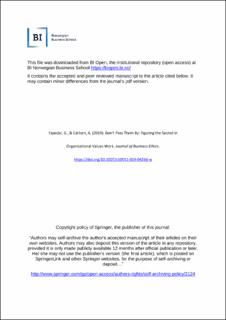| dc.contributor.author | Espedal, Gry | |
| dc.contributor.author | Carlsen, Arne | |
| dc.date.accessioned | 2020-02-18T13:30:19Z | |
| dc.date.available | 2020-02-18T13:30:19Z | |
| dc.date.created | 2019-08-26T10:56:57Z | |
| dc.date.issued | 2019 | |
| dc.identifier.citation | Journal of Business Ethics. 2019 | en_US |
| dc.identifier.issn | 0167-4544 | |
| dc.identifier.uri | https://hdl.handle.net/11250/2642334 | |
| dc.description.abstract | How and why could some stories be construed as sacred in organizations, and what functions does the sacred have in organizational values work? Research has shown how values can be made formative of a range of organizational purposes and forms but has underscored their performative, situated, and agentic nature. We address that void by studying the sacred as a potentially salient yet under-researched realm of values work. Drawing on an ethnographic case study of a faith-based health care organization and the ethical philosophy of Paul Ricoeur, we describe how the sacred is figured in two sets of tales that were lived and told with surprising intensity and consistency: the parable of the Good Samaritan and the tale of the legacy bestowed by the organization’s founder. We theorize how this figuring of the sacred in story and in action recasts values work from a centralized and unitary process to a two-way learning dialectic between the ongoing creative imitation of action and narrative. Values in the shape of stories of the sacred do not achieve their meaning as unchangeable cores or sanctioned beliefs. Rather, they come to life in a process of ongoing moral inquiry that co-evolves with moral agencies. In the latter regard, the sacred primarily becomes manifest in everyday work in the form of questioning and creative acts of care. People become moral agents when they feel and respond to the sacred in the call of the other. | en_US |
| dc.language.iso | eng | en_US |
| dc.publisher | Springer | en_US |
| dc.title | Don’t Pass Them By: Figuring the Sacred in Organizational Values Work | en_US |
| dc.type | Journal article | en_US |
| dc.type | Peer reviewed | en_US |
| dc.description.version | acceptedVersion | en_US |
| dc.rights.holder | Copyright policy of Springer, the publisher of this journal:
"Authors may self-archive the author’s accepted manuscript of their articles on their own websites. Authors may also deposit this version of the article in any repository, provided it is only made publicly available 12 months after official publication or later. He/ she may not use the publisher's version (the final article), which is posted on SpringerLink and other Springer websites, for the purpose of self-archiving or deposit…”
http://www.springer.com/gp/open-access/authors-rights/self-archiving-policy/2124 | en_US |
| dc.source.journal | Journal of Business Ethics | en_US |
| dc.identifier.doi | 10.1007/s10551-019-04266-w | |
| dc.identifier.cristin | 1718639 | |
| cristin.unitcode | 158,4,0,0 | |
| cristin.unitname | Institutt for ledelse og organisasjon | |
| cristin.ispublished | true | |
| cristin.fulltext | postprint | |
| cristin.qualitycode | 2 | |
